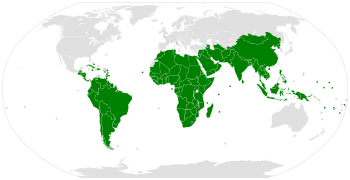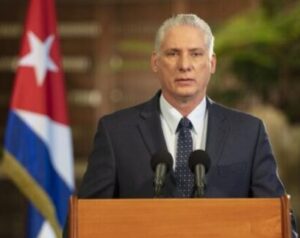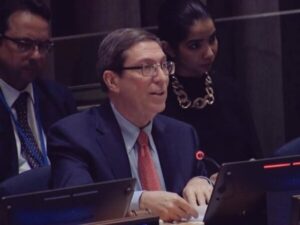The struggle for a more just world economic order
Cuba assumed the presidency of G77 on January 12, 2023. It is the first time that the Caribbean island nation will preside over the group. Cuba has announced that in its presiding year it will seek: to advance the common interests of countries in development; to support the development of a multilateral world commercial system; to make South-South cooperation a more effective instrument of the countries of the South; and to call upon the industrialized countries to fulfill their responsibilities.
The G77 plus China is formed by 134 of the 193 UN member nations, and it represents approximately 80% of the world population. It is the largest and most diverse grouping of nations seeking to develop a multilateral world order.
The G77 was created in Geneva, Switzerland on June 15, 1964 by 77 non-aligned nations, for the purpose of providing a forum for countries in development to promote their economic interests. India was the first presiding country, serving as its president in 1971-72. Cuba succeeds Pakistan, the presiding country for 2022.
China has made financial contributions to the G77 since 1994 but does not consider itself a member, although the Group of 77 counts China as one of its members. Official statements of the group are emitted in the name of the Group of 77 and China.
Cuban President Miguel Díaz-Canel addressed the Group of 77 plus China by video from the Palace of the Revolution in Havana on January 12, 2023. He thanked the group for the confidence placed in Cuba to preside for the next year. He noted that Cuba will never defraud nations with which it shares a common history of being submitted to abuse, and with which Cuba shares common historic demands and common aspirations to live in a better and more just world. He spoke of the present unjust economic order that is “a profoundly antidemocratic order that is designed to perpetuate the inequality that, in spite of the historic demands of the Group, sustains the wealth of a few at the cost of the impoverishment of the majority and maintains the peoples in an economic and social disadvantage, permanently condemned to underdevelopment, poverty, and hunger.”
He affirmed that the Group can count on Cuba and its unwavering commitment to work without rest in defense of the common interests of the nations of the Group. Cuba believes in multilateralism and in the power of a unity that respects diversity.
Bruno Rodríguez, Cuban Minister of Foreign Relation, addressed the Ceremony of the Transfer of the Presidency of G77 plus China on January 12, 2023. Rodríguez described the great challenges of the present world order in these times of systemic crisis in the areas of health, climate, energy, food, and the economy, accompanied by increasing geopolitical tensions and renewed forms of domination and hegemony. The present world order, he observed, is characterized by unequal access to vaccines, a digital gap, the persistence of the external debt, and food insecurity. There is need for structural reform of the international financial architecture, in order to make possible the financing of development and of responses to climate change.
Rodríguez cited as an example of global inequality the fact that countries in development have only 24 doses of COVID-19 vaccines per 100 inhabitants, in contrast to the richest countries, which have available nearly 150 doses per 100 persons. In addition, the countries of the South have seen their external debt doubled in the past ten years, and they had to spend an estimated 379 billion dollars of their reserves in order to defend their currencies in 2022. Meanwhile, more than thirty-one unilateral systems of coercive measures are being applied against countries in development. This tendency to impose coercive measures on countries, he noted, has increased in recent years.
Rodríguez declared that during its presidency, Cuba will give priority to encouraging international solidarity and cooperation. Cuba will work to carry out projects of cooperation from the South in the areas of health, biotechnology, education, the confronting of climate change, and the prevention of disaster, giving a lesson in unity, complementarity, and real political will.
Rodríguez noted that scientific and technological development today is monopolized by a club of countries that have the majority of patents, technologies, and research centers, and at the same time promote a brain drain from the countries in development. In response to this situation, Cuba advocates the use of science, technology, and innovation as engines of sustainable development. Accordingly, Cuba will convoke a Summit on science, technology, and innovation as a basis for development and for the confrontation of future pandemics, which will be held in Havana this year. The Summit will seek to build upon the great potential of the South in science, technology, and innovation.
The external debt, Rodríguez observed, has been paid various times over. Cuba will promote new approaches with respect to the architecture of the debt, which would provide a fiscal margin to countries in development for investment in post-pandemic recuperation, actions to confront climate change, and the Objectives of Sustainable Development; and to contribute to the avoidance of future debt crises.
Rodríguez further observed that Cuba will insist on a restructuring of the system of international financial governance, which is in the hands of a few institutions that speculate with the reserves of the South. Said institutions perpetuate underdevelopment and apply measures that merely have the purpose of reproducing the scheme of modern colonialism.
The present moment, Rodríguez declared, does not allow hesitation or division. The times require united action in defense of the long ignored demands of countries in development. Cuba embraces, he reaffirmed, the foundational principles that gave birth to G77.

The historical context: The Third World project
The creation of G77 in 1964 was the culmination of an ongoing post-World War II ideological division and political conflict between the West and global South with respect to Third World underdevelopment. As Vijay Prashad writes in The Darker Nations,
“The mainstream view in the field of economics and the halls of power within the United States and Western Europe held that development for the formerly colonized world would come through the precepts of “modernization theory.” The problem of the colonized world was not so much its poverty but its traditionalism. . . .
“Modernization theory typically put the onus for development on the cultures of the so-called traditional societies, and thereby excised the history of colonialism. . . . Modernization theory contended that that the darker world did not have the culture of frugality and thus willed itself into poverty.” 1
In accordance with these assumptions, Prashad explains, mainstream economists recommended foreign aid, which underdeveloped nations would use to increase their infrastructural capacity for the exportation of agricultural commodities and minerals, thereby exploiting its “comparative advantage” in raw materials processing.
The viewpoint of mainstream economists and holders of political power was rejected by a new field of development economics, in which Raúl Prebisch was a leading figure. Prebisch, who had been undersecretary of finance in Argentina and then director of Argentina’s Central Bank, was appointed to head the UN Economic Commission for Latin American in 1948. In 1949, he wrote and circulated a paper entitled, “The Economic Development of Latin American and Its Principal Problems,” in which he argued that the countries that had been colonized had to break out of their dependence on the exportation of raw materials and the importation of finished goods.
One strategy was the imposition of tariffs, an approach that later became known as “import-substitution industrialization.” Tariffs would make imports prohibitively expensive, and they would be strategically applied to those sectors in which a developing economy had the capacity to produce domestically.
In addition, development economists and Third World states advocated the creation of cartels of primary commodities, in which the producing and exporting nations of a particular primary commodity would ban together to set a good price, eliminating the unequal exchange that has been established by the colonial process. Primary commodities were established most notably in oil, but they also were established with less impact in cocoa, sugar, rubber, copper, and bauxite.
Prashad writes that the Third World states pushed for the creation of a UN institution to implement their agenda. The UN Conference on Trade and Development (UNCTAD) was created in response to this Third World demand, and Prebisch was named its first secretary general. It held its first conference in Geneva, in which 120 countries attended. Seventy-seven of them joined to form the G77 in 1964. It called for better prices for raw materials as well as tariffs and financial structures that favored the development of the Third World countries.
The development economists, unlike the mainstream economists of the North, maintained that colonialism was the cause of Third World underdevelopment. They believed that that there ought to be compensation for this historic crime, and that the measures that they were proposing would function as a strategy of compensation. They believed that the powerful states had a moral obligation to support their proposals for Third World development.
However, from the beginning, the core powers resisted Third World proposals. Assuming that Third World underdevelopment was caused by traditional cultures and not by Western colonialism and imperialism, they saw no moral obligation for compensatory measures. They continued with the worldwide process of competing imperialisms, in which each world power seeks maximum economic advantage with respect to the natural resources, labor, and markets of the Third World, in competition with the other imperialist powers. In pursuit of their imperialist interests, the core powers denounced the structures that were being formed to give voice to Third World concerns by Third World states and by the United Nations, and the core powers adopted maneuvers designed to neutralize Third World strategies. Utilizing the General Agreement on Trade and Tariffs, the International Monetary Fund, and the World Bank, the rich countries were able to maintain and increase their global structural economic advantage, casting aside Third World demands and hopes. 2
Cuba is well-qualified
Since the triumph of the Revolution, Cuba has denounced the economic structures of the world-system and the imperialist policies of the world powers. (See “Second Declaration of Havana, 60th anniversary: Fidel speaks of the crisis of imperialism and the interest of humanity in socialism,” February 8, 2022). Cuba has for decades played a leading role in the Third World quest for alternative, more just global political-economic structures. For example, as President of the Non-Aligned Movement from 1979 to 1982, Cuba denounced the turn of the core powers to neoliberalism. (See “Fidel speaks in the name of the colonized: In defense of all of humanity,” August 17, 2021). And during its second presidency of the Non-Aligned Movement from 2006 to 2009, Cuba was able to lead the Movement to a retaking of its founding principles. (See “China and the Third World: The construction of an alternative, more just world-system,” 10/1/2021). Moreover, during the last twenty-five years, Cuba has played a leading role in the formation of such regional organizations as ALBA-TCP, UNASUR, and CELAC, advocating Latin American union and integration on a basis of mutually-beneficial trade among the nations of the region. (See “ALBA-TCP Summit in Havana: The quest for Latin American and Caribbean unity and integration,” May 31, 2022
Cuba has impressive credentials for assuming the presidency of G77 at the current historic juncture.





